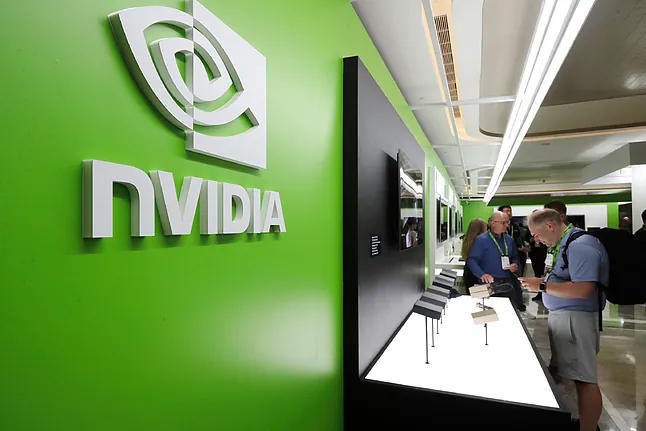All eyes in the market, and from governments around the world, were on Nvidia today. It is the world's largest company by market capitalization (surpassing five trillion dollars in October), the main reference in the AI sector, but also, for many, a barometer of the volatility of an industry in the midst of a brutal expansion, yet with growing bubble rumors.
The day on Wall Street was marked by analysts and investors awaiting the results of the third quarter from the world's most important chip manufacturer, which holds around 90% of the market share in major artificial intelligence projects. And it did not disappoint. The company was expected to report an increase of up to 56% in total year-over-year revenue and project revenues of $62.2 billion for the fourth quarter of the year. The reality exceeded expectations. Revenues have risen by 62%, reaching $57 billion, $2 billion more than estimated. Data center revenues rose to $51.2 billion, $2 billion more than expected. And for the next quarter, the company expects revenues between $65 billion and $66 billion.
Quarterly earnings amounted to $31.9 billion, a 65% increase from the previous year and 245% more than two years ago. Among tech giants, only Alphabet, Google's parent company, had higher profits in the same period.
"Blackwell sales have surged, and cloud GPUs are sold out," boasted CEO Jensen Huang. "The demand for computing continues to accelerate and multiply in both training and inference, growing exponentially in both cases. We have entered the virtuous circle of AI. The AI ecosystem is scaling rapidly, with more basic model creators, more AI startups in more sectors and countries. AI is everywhere, doing everything, simultaneously," said Huang, who this morning attended an event with Donald Trump and the Crown Prince of Saudi Arabia as guests.
The problem in the near future is dying from success. It is almost impossible to maintain this growth rate. The over $60 billion in revenues that Nvidia expects for the fourth quarter of the year is 10 times more than what it earned in 2022. The projected net profits for this year, over $100 billion, exceed the total combined sales of Intel and AMD. The volume is so gigantic that any movement causes ripples. Nvidia's shares rose nearly 5% after the market closed (after improving by 3% during the day), before falling slightly. But the company is so large that a few percentage points represent tens of thousands, up to $100 billion in market value.
The quarterly results were expected not only to gauge the health of a skyrocketing company but also of a transformative phenomenon that explains the market's optimism in a moment of chaotic political, business, and macroeconomic uncertainty. With a heavily indebted U.S., spending more than it earns and putting all its eggs in one basket for the future. The issue is not just the volumes, the fever for anything related to AI, the constant emergence of startups, and how money flies. But also the cross-operations.
For example, a $500 billion investment sponsored by Trump with Oracle and OpenAI. The business shift of the latter with Microsoft, which in turn has partnered with Nvidia and Anthropic. Yesterday, the three companies announced that the chip manufacturer and the software giant will invest $10 billion and $5 billion respectively in the AI development company, while Anthropic will acquire $30 billion in Microsoft Azure computing capacity and collaborate with both on design and engineering.
According to Pitchbook data, Nvidia invested $23.7 billion in sector companies with 59 deals so far this year. In all of 2024, Nvidia closed a total of 54 deals worth $22.8 billion. And investments in AI companies, 170 since 2020, exceed $53 billion. Only in OpenAI has it invested $100 billion, raising many doubts about the extent to which the company is buying chips from itself.
But the skeptical movements are also impressive. Last month, Huang revealed that the company had orders worth $500 billion for the years 2025 and 2026, including the upcoming Rubin chip, whose large-scale distribution will begin next year.
Nvidia's shares fell by 7.9% in November after prominent investors divested their positions. Thiel Macro, Peter Thiel's hedge fund, which had around $100 million, did so. And especially Softbank, with around $5.8 billion. Michael Burry, the investor who became a legend (and protagonist of Michael Lewis' book 'The Big Short') and wealthy for predicting and betting on the 2008 real estate collapse, denounced the AI market this week, announcing his exit and reproaching it as a "rigged" sector that he does not understand.
